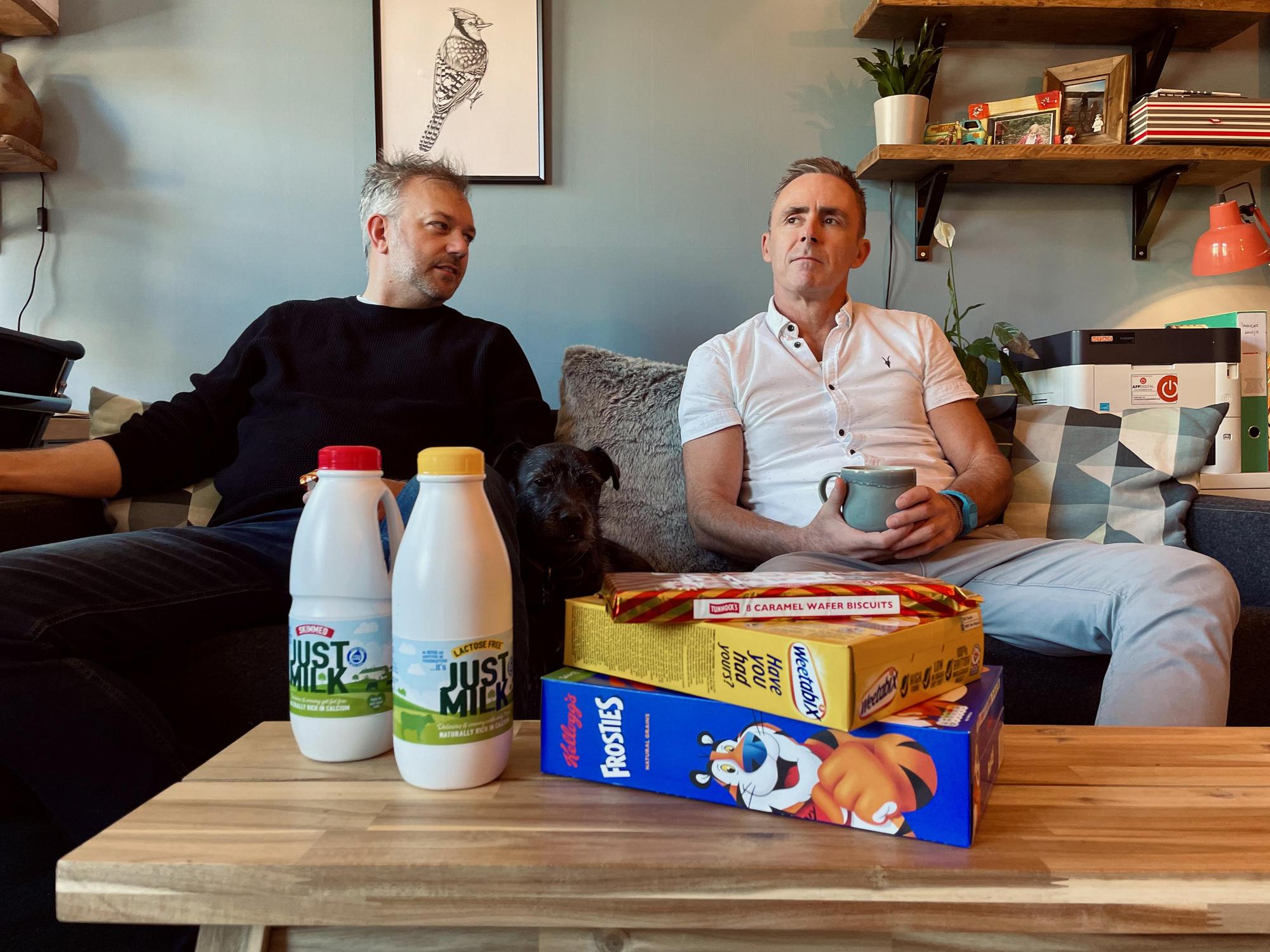Tell us about yourself?
We are Warren and Jim, a founders partnership who have bootstrapped Float – an online grocery business. We’re on a mission to deliver great-tasting lactose-free and UHT milk and other groceries to customers across the country.
We both started out with digital marketing businesses – Warren is a designer, Jim a media and marketing expert – and combined our skillsets to power Float. By applying all that we have done for clients over the years, we’ve been able to grow Float organically since it was launched
Everything that Float is, from the branding and website, through to the marketing strategy and customer acquisition activity, we’ve created and delivered ourselves.
What do you think is the single biggest misconception people have when it comes to startups?
That is an excellent question and we’d say that, beyond Float and leaning on our client marketing experience, we’d say that there are a few.
Up there in the ‘founder’ space is that you need some sort of funding, investment, or VC on board to make things happen. Sure, their money can really accelerate what you’re doing or fund tools and equipment, but taking that money means giving away a lot of your equity.
We see a lot of LinkedIn content especially from people who talk about ‘hustle’ and going ‘all-in’ with massive credit card debts and the like, but now they’ve bought a Ferrari… we’ve all seen those posts. We call that ‘failure porn’ and it’s far from helpful to many founders. Debt kills businesses. Sure, you have to spend a bit to reach your customers, but manage that debt and keep it under control.
Then there’s the ‘Field of Dreams’ believers who think that having a website is enough – I’ve built it, they will come. That’s never been further from the truth. Attracting customers takes time and work – lots of work and it’s work that never ends.
There are also the ‘idealists’ who think it’s all about the idea. The best ideas don’t necessarily resonate with customers. They’re the people who think that their idea or product is for everyone and don’t truly understand their customers. They’re often unrealistic about their likely volumes and reach.
If you could go back in time to any moment from your journey, and give yourself one tip, what would it be?
Oooh – another excellent question. So many lessons in such a short time with Float.
We would say that we learned that we need to be the faces and names behind the brand and not to be afraid of standing up and selling Float through ourselves. An interview like this is an alien space for us. We’ve been conditioned to be the guys behind the camera, out of the spotlight but we’ve learned that making Float a success requires us to step forward and be the faces of the brand.
We also learned quite quickly about communication and how to step away from being Solopreneurs and becoming partners. Adapting ourselves to work more efficiently and effectively with one another and being better communicators, idea sharers, and actors in the space. We learned to treat Float as one of our clients.
We also learned the power of being organised and very structured in our actions. We both came from a very reactive space where the best plans in the world could be thrown aside by a single client call or moment outside our sphere of control. When we became our own client, we became more structured and organised. More proactive. That was a huge change for us but very worthwhile.
What makes you stand out as an entrepreneur?
We have lots of knowledge and experience in marketing and design and we bring that to Float – that under-pins its success but I don’t think that either of us would say that we ‘stand out’ as entrepreneurs. We’re dedicated, persistent, and hard-working and that is the key to any successful entrepreneurial experience.
What are some of the best working habits you’ve gained over the past couple of years?
We’ve certainly learned to be better communicators with one another and how to share our ideas positively and productively. How to reject an idea we don’t both buy into in a way that is positive and helpful but also how to drive forward the good stuff.
We’ve become more structured in our working methods and practices too. Social media posts, for instance, are scheduled weeks in advance, leaving us the space to do more fun, reactive and ad-hoc activities when the mood grabs us or we have a couple of spare minutes.
That might seem obvious and it was certainly the advice we’d give clients, but learning to do that ourselves was a step-change worth making.
Give us a bit of an insight into the influences behind the company?
Float is definitely one of those lockdown-born businesses. We noticed that people we knew who were lactose intolerant were struggling to get lactose-free milk from the supermarkets. Also, those same customers really didn’t want to be going out to the supermarkets to keep looking for and buying milk. So, something that was delivered to their door and with a subscription base would fit neatly with their needs. Once we had the idea, the rest was a matter of plugging the gaps and creating a customer journey that worked.
Where do you see your business in five years?
Milk can only take us so far and that isn’t really what the business is. Instead, we have created a template that we can re-brand and evolve into other products that customers need regularly and would benefit from receiving directly instead of having to go out and purchase. Our plan is to deliver a range of other products through dedicated websites and brands that replicate Float’s operating structure.
What do you think the biggest challenge will be for you in getting there?
Right now, our biggest challenge is fulfilment and getting products to customers. The UK-wide driver shortage has hit us hard in our first few months and it’s been a huge challenge managing that. There does seem to be some light at the end of the tunnel though.
Finding the products that best fit our model and customer base is the biggest long-term challenge we face. We don’t just want any old thing thrown on the website, we are carefully auditing and reviewing different product categories and types to find something that really fits with our requirements.
Talk to us about your biggest success story so far?
We’re both really proud of the launch and the organic growth we’ve seen since. Getting the website live was a process that was pretty natural to us and something we’d already done a thousand times. Same with the marketing and getting that started, but to see that translate into sales and subscribers was a really exciting and fascinating process.
The moments when we’re able to step back and look at the data and growth over time and to say “you know what, we did that and it’s brilliant” are very special and exciting. When you’re in the eye of the storm and obsessing over every second of every day, it’s hard to see how far you’ve come.
How do clients and customers find you? Are you much of a salesperson for yourself?
As a purely digital business, we’re reliant on digital acquisition channels. So PPC, SEO, and social media are where we invest a lot of our time. PPC is a key customer driver, SEO does a brand and direct response job while our social media presence is a primary brand driver.
We’ve learned that we have to advocate for the brand ourselves so we’ve had to step into the spotlight and be Float’s stars and heroes. We are there to help promote the brand and the marketing activity is there to sell the products.
What one tip would you give to fellow startup founders?
It’s trite to say “believe in yourself and your idea” but it’s also somewhat true.
There are plenty of people out there who are happy to take money from founders (and therefore money out of their businesses) who really don’t and often can’t help. There is no formula for “10x’ing” your business or accelerating your growth. For the most part, those seminars and courses, all priced with a 7 at the end for some reason are a bit of a con.
The founders who work hard, develop a good understanding of their customers, and drive their businesses forward will succeed.
And finally, what do you hope the future brings both you personally, and your business?
We’re both excited about the future and what it holds. The more “Floatotypes” we can launch and the more product sets we can roll out, the happier we will be. OK, we’re in this to make money, just like everyone else, so a nice, steady income stream would be wonderful, but the more we grow and the more people we reach, the more pride we’ll take.
And that’s what it’s all about for us.




